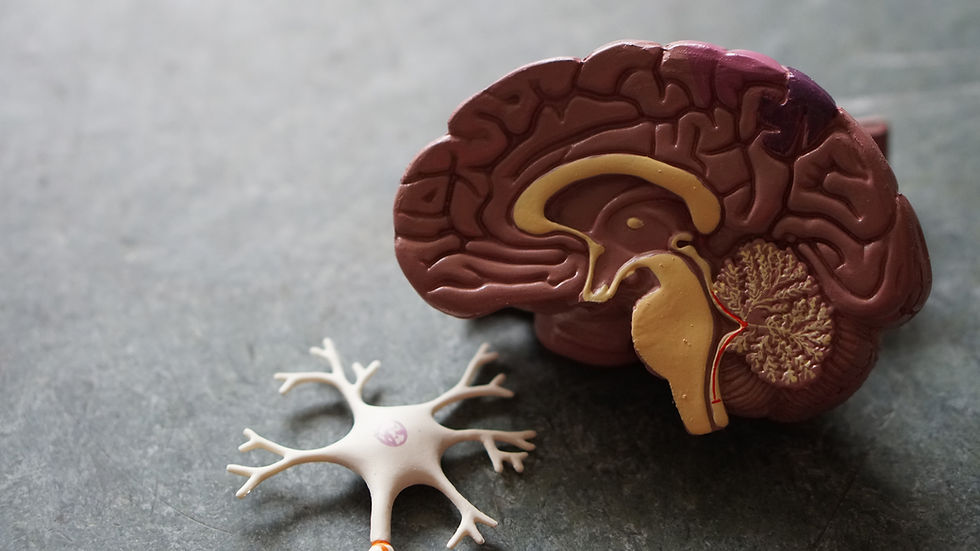Herbal Therapies for the Nervous System
- Kerrie Hyland
- Nov 16, 2023
- 3 min read
The nervous system is a complex system that plays many roles in a biological system.
There is the physical Central Nervous System (CNS), which is composed of the brain, spinal cord, and the nerves. Then we can also think of the nervous system as our emotions and feelings. The central nervous system is responsible for control and regulation, and works in close co-ordination with the endocrine system. This is what we refer to as the neuro-endocrine system.

Many nervous system conditions and problems are a combination of neurological issues, and neurotransmitter and endocrine dysregulation.
Herbal therapies help the nervous system.
Herbal medicine can work well to help regulate, nourish and support the nervous system and the hormonal regulation of the neuroendocrine system.
In my practice I have been using herbal medicine successfully to help to support animals with many different neurological conditions, and health concerns that we think of as mental disease- Anxiety, obsessive compulsive disorders, insomnia and behavioural issues.
Herbal medicine can come in several forms, such as Teas, tablets, dried herbs and liquid extracts. I generally use liquid extracts that are on a ethanol and water base. I find these to be more effective than other forms, and a re much more concentrated than other forms available.
Herbal extracts also afford me the ability to modify and adjust the mix to each individual dogs needs, depending on their specific situation.
I use Western Herbal Medicine, with a fusion of some Chinese and Ayurvedic herbs. So the herbs that I outline here will be predominantly from Western Herbal medicine practices.
There are many many herbs, and this list is only a taste of some of the herbs I find I use regularly.
I want to share with you the different actions we find in herbal medicines that can be useful when supporting the nervous system, and how these fit into supporting the health outcomes we are after. We can find that some herbs fall into several categories, making some herbs more appropriate than others for different presentations and situations.

Herbal Therapy actions for the nervous system
Nervines
nervines support the nervous system. This can occur as a general tonic action, supporting and nourishing the nervous system.
herbal examples are oats, gotu kola, vervain, st johns wort
some nervines are more relaxing and calming to the nervous system are sometimes referred to as relaxants.
These are herbs such as lavender, lemon balm, chamomile, skullcap, passionflower
Nervines that increase function through stimulation
green tea, kola and even coffee
Anxiolytics
Anxiolytics help to reduce feelings of anxiety, and bring about a more calm and relaxed energy to the system.
Californian poppy, green oats, kava, valerian, passionflower, valerian, vervain
Nootropics
nootropics- help to improve cognition and memory, and help to increase nerve growth. These are a cool group of herbs and can be very supportive in times of neural injury and accident recovery.
Bacopa, ginkgo, lions mane, st johns wort, Gotu Kola.
Sedatives
sedatives help to reduce or suppress the activity of the central nervous system, to help bring about relaxation and calmness.
Withania, californian poppy, chamomile, hops, lemon balm, passion flower, skullcap vervain, zyziphus
Hypnotics
Hypnotics- induces sleepiness and helps to bring on sleep. Many of the sedatives and relaxing nervines are hypnotics at higher dosing.
Californian poppy, hops, kava, valerian, passion flower. Zizyphus

Adaptopgenic
Adaptogenics helps to support and regulate the bodies stress response, helping to improve resiliance and ability to cope with stress. These can help to support the nervous system and also the adrenal glands. These are great for improving tolerance and resiliance around stressors that cannot be avoided.
withania, astragalus, ginseng, schizandra and licorice
Trophorestorative
Trophorestoratives help to support and nourish certain organs or tissues, helping to restore function. A nervous system trophorestaorative supports the nervous system tissues and organs.
These include St johns wort, oats, skullcap
Analgesics
Analgesics helps to reduce pain. Some herbal medicines work through anti-inflammatory action, and others work more specifically on neurologic pain pathways.
Devils claw, kava, willow bark, turmeric, St johns wort, corydalis
When choosing the herbs that are most appropriate for the individual I look into the presenting symptoms, and what is driving these symptoms to manifest. By addressing the drivers at the same time as the symptoms, it helps to bring about healing and recovery, rather than masking symptoms that often return when herbal therapies are stopped.
If your pet has a condition that is affecting the nervous system, or you need more help in understanding the drivers and how to address this, please book in for a comprehensive consultation.
Give your dog a pat for me x
.png)
コメント